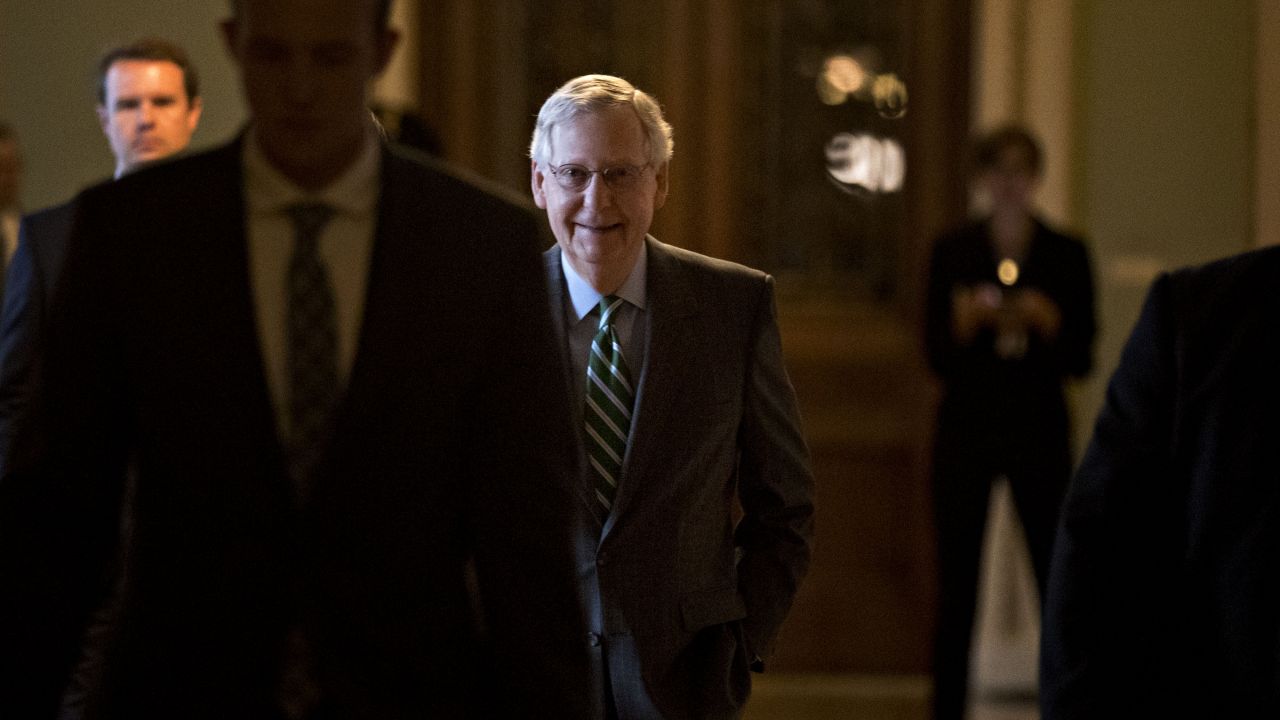
Senate Majority Leader Mitch McConnell (R-KY) walks toward his office at the US Capitol in Washington, DC, on June 22, 2017. (Photo by Andrew Harrer/Bloomberg via Getty Images)
This post originally appeared at Kaiser Health News.
Republicans in the Senate on Thursday unveiled a bill that would dramatically transform the nation’s Medicaid program, make significant changes to the federal health law’s tax credits that help lower-income people buy insurance and allow states to water down changes to some of the law’s coverage guarantees.
The bill also repeals the tax mechanism that funded the Affordable Care Act’s benefits, resulting in hundreds of billions of dollars in tax cuts for the wealthy and health care industry.
Most senators got their first look at the bill as it was released Thursday morning. It had been crafted in secret over the past several weeks. Senate Majority Leader Mitch McConnell (R-KY) is seeking a vote on the bill before Congress leaves next week for its 4th of July recess.
Senators had promised that their ACA replacement would be very different than the version that passed the House in May, but the bill instead follows the House’s lead in many ways.
Reversing course on some of the more popular provisions of the Affordable Care Act, it threatens to leave tens of millions of lower-income Americans without insurance and those with chronic or expensive medical conditions once again financially vulnerable.
Like the House measure, the Senate bill, which is being called a “discussion draft,” would not completely repeal the ACA but would roll back many of the law’s key provisions. Both bills would also — for the first time — cap federal funding for the Medicaid program, which covers more than 70 million low-income Americans. Since its inception in 1965, the federal government has matched state spending for Medicaid. The new bill would shift much of that burden back to states.
The bill would also reconfigure how Americans with slightly higher incomes who don’t qualify for Medicaid would get tax credits to help pay insurance premiums and eliminate penalties for those who fail to obtain insurance and employers who fail to provide it. It also would make it easier for states to waive consumer protections in the ACA that require insurance companies to charge the same premiums to sick and healthy people and to provide a specific set of benefits.
“We agreed on the need to free Americans from Obamacare’s mandates, and policies contained in the discussion draft will repeal the individual mandate so Americans are no longer forced to buy insurance they don’t need or can’t afford; will repeal the employer mandate so Americans no longer see their hours and take-home pay cut by employers because of it,” McConnell said on the floor of the Senate after releasing the bill. He also noted that the bill would help “stabilize the insurance markets that are collapsing under Obamacare as well.”
As expected, Senate Minority Leader Chuck Schumer (D-NY) assailed the bill, saying it would “strip away health care benefits and protections from Americans who need it most” through changes in Medicaid and the ACA’s essential health benefits. “Even though much of the early reporting says the bill will keep certain protections for Americans with preexisting conditions,” he added, “the truth is it may well not guarantee them the coverage they need. By allowing states to waive essential health benefits, what the bill is saying to those Americans is: Insurance still has to cover you, but it doesn’t have to cover what you may actually need; it doesn’t have to cover all or even most of your costs.”
The White House had no immediate comment, but President Donald Trump has been pressuring Congress to pass a health bill quickly.
It is not clear that the bill will make it through the Senate, or that all of it will even make it to the Senate floor. The Senate (like the House) is operating under a special set of budget rules that allow it to pass this measure with only a simple majority vote and block Democrats from dragging out the debate by using a filibuster. But the “budget reconciliation” process comes with strict rules, including the requirement that every provision of the bill primarily impact the federal budget, either adding to or subtracting from federal spending.
For example, the legislation as released includes a one-year ban on Medicaid funding for Planned Parenthood. That is a key demand of anti-abortion groups and some congressional conservatives, because Planned Parenthood performs abortions with non-federal funding. But it is not yet clear that the Senate parliamentarian will allow that provision to be included in the bill.
Also still in question is a provision of the Senate bill that would allow states to waive insurance regulations in the Affordable Care Act. Many budget experts say that runs afoul of Senate budget rules because the federal funding impact is “merely incidental” to the policy.
Drafting the Senate bill has been a delicate dance for McConnell. With only 52 Republicans in the chamber and Democrats united in opposition to the unraveling of the health law, McConnell can afford to lose only two votes and still pass the bill with a tie-breaking vote from Vice President Mike Pence. McConnell has been leading a small working group of senators — all men — but even some of those have complained they were not able to take part in much of the shaping of the measure, which seems to have been largely written by McConnell’s own staff.
So far, McConnell has been fielding complaints from the more moderate and more conservative wings of his party. And the draft that has emerged appears to try to placate both.
For example, as sought by moderates, the bill would phase down the Medicaid expansion from 2020 to 2024, somewhat more slowly than the House bill does. But it would still end eventually. The Senate bill also departs from the House bill’s flat tax credits to help pay for insurance, which would have added thousands of dollars to the premiums of poorer and older people not yet eligible for Medicare.
A Congressional Budget Office report estimating the Senate bill’s impact on individuals and the federal budget is expected early next week. The House bill, according to the CBO, would result in 23 million fewer Americans having health insurance over 10 years.
For conservatives, however, the Senate bill would clamp down even harder on Medicaid in later years. The cap imposed by the House would grow more slowly than Medicaid spending has, but the Senate’s cap would grow even more slowly than the House’s. That would leave states with few options other than raising taxes, cutting eligibility or cutting benefits in order to maintain their programs.
Defenders of the health law were quick to react.
Sen. Ron Wyden (D-OR) complained about changes to coverage guarantees in the ACA.
“I also want to make special note of the state waiver provision. Republicans have twisted and abused a part of the Affordable Care Act I wrote to promote state innovation, and they’re using it to give insurance companies the power to run roughshod over individuals,” he said in a statement issued shortly after the bill was released. “This amounts to hiding an attack on basic health care guarantees behind state waivers, and I will fight it at every turn.”
“The heartless Senate health care repeal bill makes health care worse for everyone — it raises costs, cuts coverage, weakens protections and cuts even more from Medicaid than the mean House bill,” said a statement from Protect Our Care, an umbrella advocacy group opposing GOP changes to the health law. “They wrote their plan in secret and are rushing forward with a vote next week because they know how much harm their bill does to millions of people.”
Kaiser Health News, a nonprofit health newsroom whose stories appear in news outlets nationwide, is an editorially independent part of the Kaiser Family Foundation.




